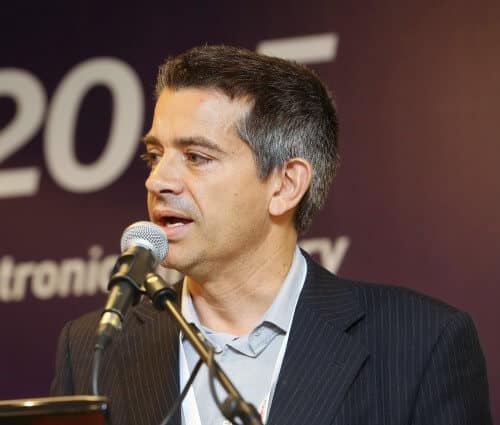Prof. Bennini said these things at the ChipEx2015 conference. To bring the calculation capability closer to the sensors, they must be made very efficient in energy consumption

Smart sensors, which are the foundation of the Internet of Things will require local computing ability. This is what Prof. Luca Bennini, an expert in low power consumption component development research from the University of Bologna and ETH ZURICH, said at the opening session of the ChipEx2015 conference held recently in Tel Aviv by the Chiportal website.
Prof. Bennini gave some examples, for example processing, the raw file of images from security cameras requires a size of 100 kilobytes per image. Processing that will classify the photographed in them, perform a situation analysis and identify the photographed could save enormous bandwidth.
Even voice processing, which in raw form takes up 10 kilobits, could shrink if the sensor is accompanied by the ability to recognize voice, classify the content of the conversation and analyze voice signatures.
The sensor will also be able to take advantage of the processing to monitor its condition and allow preventive maintenance work to be performed (eg battery replacement).
One of the main limitations to the use of powerful processors in sensors is of course the energy limit. In order to produce systems that will survive for years without changing the battery or that will harvest energy from the environment, we must first decrease the energy consumption from 1-2 milliwatts per sensor to a few microwatts, that is, an order of magnitude of one thousandth.
Later, Prof. Benini showed the effect of Moore's Law on the development of CMOS in the last forty years, which was manifested in increased intelligence. However, there is still a long way to go to reach the density and calculation capacity of the biological brain. The energy efficiency of the brain is so high as to one gigabyte per milliwatt.
One of the problems is that we don't have a clear standard in the so-called Internet of Things applications in regards to processing on the sensor. We have better standards for communication, but the calculation is not standardized.
Prof. Benini also added that it is not worth doing the calculation on the chips in which the software is embedded (HARD WIRED) and which perform only one operation, we need calculations. This means programmable computing. This means open software, open tools and hopefully also open hardware to leverage as much as possible the flexibility of computing power. The interesting thing is that these words were said about a month before the Intel company announced the purchase of the Altra company, a manufacturer of programmable chips (FPGA) for about 17 billion dollars.
In conclusion, Prof. Benini says that the Internet of Things is a challenge but also an opportunity, thanks to which we are required to push computing capacity to the limit. The four "aces" that will help us build a cost-effective processor for the IOT sensors are:
- Don't waste energy. If necessary, do not use all the capabilities of the chip
- Local computing is a good thing
- Use all dimensions (use of XNUMXD chips)
- taught to specialize
Are we getting close to that? Yes, we are efficient and if we reach 1 gigabytes per milliwatt we will make a lot of progress, but we will have to respond to the ever-increasing demand of applications such as a 4k camera. If you want to calculate with the technologies that exist today, the output of a 4K broadcast will be required for 1 terabyte. This is an example of the way in which the needs will oblige us to use the computing capacity to the end. The fun is just beginning.
The article was first published on the Chiportal website - a chip industry portalChiportal website - Israel's chip industry portal
